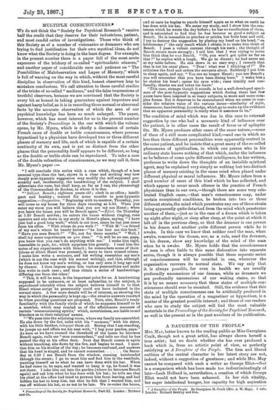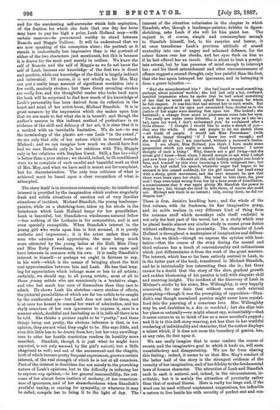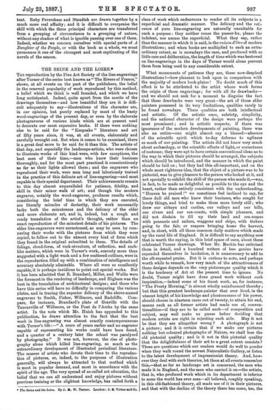A DAUGHTER OF THE PEOPLE.*
Mits. Mar, better known to the reading public as Mills Georgiana Craik, though not a great artist, has always shown herself a true artist ; but we doubt whether she has ever produced a book which is, from an artistic point of view, so perfectly satisfying as A Daughter of the People. The firm and liberal outlines of the central character in her latest story are not, indeed, without a suggestion of greatness ; and while Mrs. May cannot be compared. with such a writer as George Eliot—that is a comparison which has been made too indiscriminatingly of late—Leah Holland is, nevertheless, a creation of which George Eliot would not have been ashamed. In her rich vitality, her eager intellectual hunger, her capacity for high aspiration • A Daughter of the Norio. By Goorgiana M. Craik (Sire. A. W. May). 3 vols. London: Richard Bentley and Son. and for the unrelenting self-surrender which foils aspiration, of the fruition for which she feels that one day her lover may have to pay too high a price, Leah Holland may—with certain reserves—be pronounced worthy to stand between Romola and Maggie Tulliver. It will be understood that we are now speaking of the conception alone; the portrait as it stands is undoubtedly less impressive than is the portrait of either of the two characters just mentioned, but this is because it is drawn for the most part merely in outline. We know the self of Romola and the self of Maggie as we do not know the self of Leah, because our knowledge of the first two is direct and positive, while our knowledge of the third is largely indirect and inferential. Of course, it is not wholly so, for Mrs. May can put a really large amount of significant revelation into a few swift, masterly strokes ; but these direct revealing strokes are really few, and the thoughtful reader who looks back upon the book will be surprised to find how much of his knowledge of Leah's personality has been derived from its reflection in the heart and mind of her artist-lover, Michael Standish. It is in great measure by the impression which she makes upon him that we are made to feel what she is in herself; and though the author's success in this indirect method of portraiture is an evidence of the skill and delicacy of her art, it is clear that it is a method with an inevitable limitation. We do not—to use the terminology of the plastic art—see Leah " in the round ;" we see only that side of her nature which is turned towards Michael; and we can imagine how much we should have lost had we seen Romola only in her relations with Tito, Maggie only in her relations with Stephen Guest. Still, a fine bas-relief is better than a poor statue ; we should, indeed, be ill-conditioned were we to complain of such careful and beautiful work as that of Mrs. May, and what we have said is meant not for complaint, but for characterisation. The only true criticism of what is achieved must be based upon a clear recognition of what is attempted.
The story itself is in structure extremely simple; its intellectual interest is provided by the imagination which evolves singularly fresh and subtle situations of emotion out of very familiar situations of incident. Michael Standish, the young landscape- painter, while on a sketching-tour, takes up his abode in the farmhouse which Leah Holland keeps for her grandfather. Leah is beautiful, but Standish—a wholesome-natured fellow —has nothing of the Lothario in his composition, and is not even specially susceptible. When Standish's interest in the young girl who waits upon him is first aroused, it is purely msthetic and impersonal ; it is the artist rather than the man who admires and appreciates, the man being much more attracted by the young ladies at the Hall, Miss Cies), and Miss Ruby Feversham, who are of his own caste and have interests in common with his own. It is really Standish's interest in himself—or perhaps we ought in fairness to say, in his work—which is the means of bringing about the first real approximation between him and Leah. He has that long- ing for appreciation which belongs more or less to all artists; certainly, we should say, to all young artists; most of all to those young artists who are consciously in a tentative stage, and who feel much less sure of themselves than they care to admit. He shows Leah his sketches—mere studies of effects, the pictorial possibilities of which are far too subtle to be caught by the uneducated eye—but Leah does not care for them, and is at once too honest to conceal her want of admiration, and too shyly conscious of her own ignorance to express it, save in a manner which, doubtful and hesitating as it is, Leila all there is to be told. She thinks a picture ought to be "pretty," and these things being not pretty, the obvious inference is that, in her opinion, they are not what they ought to be. She says little, and even this little has to be drawn from her; but her very unwilling- ness to utter her hostile conviction renders its hostility more manifest. Standish, though it is just what he might have expected, is not only amused by the girl's naivete, but a little chagrined as well; and out of the amusement and the chagrin, both of which become pretty frequent experiences, grows a certain interest, of the real strength of which he is not at all conscious. Part of the interest is doubtless due not merely to the provoking nature of Leah's opinions, but to the difficulty in inducing her to express any opinion,—to her general inaccessibility, the out- come of her almost fierce instinct of modesty, of her conscious- ness of ignorance, and of her shamefacedness when Standish's youthful vanity, or craving for sympathy, or whatever it may be called, compels her to bring it to the light of day. The
interest of the situation culminates in the chapter in which Standish, who, though a landscape-painter, dabbles in figure- sketching, asks Leah if she will let him paint her. The request is, of course, simple and commonplace enough to Standish himself, but, to his surprise and horror, it at once transforms Leah's previous attitude of armed neutrality into one of angry and ashamed defiance, for the colour flames over her cheeks, and her eyes flash on him as if he had offered her an insult. She is about to beat a precipi- tate retreat, but he has presence of mind enough to intercept her; and his blank astonishment and utter unconsciousness of offence suggest a second thought, only less painful than the first, that she has again betrayed her ignorance, and in betraying it done a grave injustice :—
" Had she misunderstood him ? She had heard or read something, perhaps, about painters' models ; she had had only a hot, confused, insulted impression when he spoke that he had asked something of her that he would not have asked from a woman for whom he felt respect. It was this that had stirred her to such wrath. But now, as she gazed at his open and astonished face, doubts as to the justice of her anger were stealing feet upon her. She looked ; she hesitated ; a change from scorn to piteousness came into her eyes. ' You really are under some delusion. I am as sorry as I can be; but, upon my word, I don't understand you,' he exclaimed after a little silence. I thought I should like to make a sketch of you— that was the whole. I often ask people to let me sketch them —all kinds of people. I would ask Miss Faversham' (with a sadden, happy thought) 'if I knew her well enough ; and she would sit to me, I am convinced, without a moment's hesita- tion. I am afraid, Miss Holland, you think I have made some proposition which you ought to resent. Good heavens! I never thought of such a thing ! Why, there's not a girl living—not the nicest girl I know—from whom I should scruple to ask what I asked just now from you.'—He said all this, still looking straight into Leah's face, and himself by this time becoming a little indignant too ; but when he had ended his speech, whatever anger bad begun to be aroused in him ceased suddenly, for the girl turned her head away with a sharp, quick movement, and the next moment he saw that there were tears upon her cheek. She tried to hide them, for, poor soul ! they were tears wrong from her by a keen sense of humiliation, a consciousness that it was again giving Mr. Standish the power to despise her ; but, though she tried to hide them, of course she could not. Michael saw them in an instant; only, seeing them, he did not despise her."
There is firm, decisive handling here ; and the whole of the first volume, with its freshness, its fine imaginative grasp, and its noble realism (a very different kind of thing from the noisome stuff which nowadays calls itself realistic) is not only the best part of the novel, but is a study which may be placed beside almost any similar study in recent prose fiction without suffering from the proximity. The character of Leah Holland is throughout a masterpiece of imagination and delinea- tion; but we think—though we express the opinion with hesi- tation—that the course of the story during the second and third volumes has a touch of conventionality and ordinariness which just differentiates it from the work of the great masters. The interest, which has so far been entirely centred in Leah, is, in the latter part of the book, transferred to Michael Standish, and he is intrinsically less interesting than she is ; but there cannot be a doubt that the story of the slow, gradual growth and sudden blossoming of his passion is told with singular skill and unerring insight. The incident of the discovery of Leah in Michael's studio by his sister, Mrs. Willoughby, is very happily conceived, for one feels that without some such external prompting—though it was the prompting of opposition—Stan- dish's real though unrealised passion might never have crystal- lised Me the yearning of a conscious love. Mrs. Willoughby may be, and doubtless is, a den ea; machind ; but she slips into her place so naturally—we might almost say, so inevitably—that it never occurs to us to think of her as a mere novelist's puppet ; and it is in this deft story-weaving, not less than in her truthful rendering of individuality and character, that the author displays a talent which, if it does not cross the boundary of genius, has, at any rats, its foot upon it.
We can easily imagine that to some readers the course of events, and the imaginative goal to which it leads us, will seem unsatisfactory and disappointing. We are far from sharing this feeling; indeed, it seems to us that Mrs. May's conduct of the latter half of the story is the strongest evidence of the veracity of her imagination, and of her fidelity to the fundamental laws of human character. The attraction of Leah and Standish each to each is natural, and, indeed, in the circumstances, in- evitable; but it is mainly the attraction of proximity rather than that of mutual fitness. Hers is really too large and, if the word can be used without unpleasant suggestions, too inflexible a nature to live beside his with security of perfect rest and eon-
tent. Ruby Feversham and Standish are drawn together by a much more real affinity ; and it is difficult to overpraise the skill with which the three principal characters are transferred from a grouping of circumstance to a grouping of nature, without any shadow of what is ignoble passing over one of them. Indeed, whether we concern ourselves with special parts of A Daughter of the People, or with the book as a whole, we must pronounce it one of the strongest and most captivating of the novels of the season.




































 Previous page
Previous page